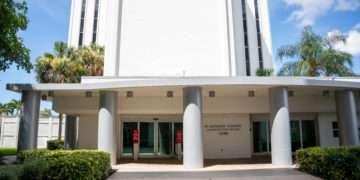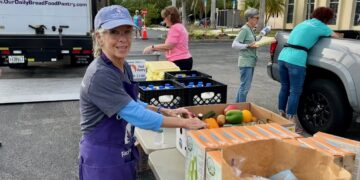Pace Center for Girls Collier is celebrating its 25th anniversary of helping girls in the Immokalee area stay out of the juvenile justice system by giving them proper education and a new outlook on life.
The nonprofit, which is in 23 total communities, cares for about 3,000 girls each year. The organization was founded in 1985 in Jacksonville and was originally called Practical and Cultural Education.
“This small group of women who started Pace in Jacksonville, they recognized that girls were being locked up at high rates in these high poverty areas and came to a conclusion that most of the girls also had very high levels of trauma,” Pace Collier Executive Director Marianne Kearns said. “And due to the trauma, it was found that maybe they were committing small crimes and ended up in the detention centers.”
Through the program’s counseling and academic work, Pace showed stakeholders in the community by addressing a girl’s trauma and giving her personal attention and care, she is able to avoid detention centers and not recommit crimes.
Since Pace in Immokalee opened its doors 25 years ago, it has served more than 2,000 girls. According to a recent statistic, nine out of 10 girls who advance through the program become engaged in their community by either enrolling back in high school, higher education or employment.
When the program began in Collier, there were 10 staff members working with 30 girls. Now, having moved into a larger building, there is room for 25 staff to serve up to 70 girls. There are additional girls in the transition phase who’ve already undergone the 15-to-18-month program and gone through transitional services with staff to ensure they stay on track.
“Even though the building opened in 2007, it’s still just a beautiful haven for our girls because now they have a lot of space to learn and grow and we have more team members to help them do that,” Kearns said.
It takes more than showing interest in Pace for a girl to be eligible to enroll in the program. Applicants, who include victims of sexual assault, those suffering from eating disorders and those underachieving academically, must go through an assessment process to identify risk factors.
Pace follows three pillars to address the needs of girls who enter their program, including being trauma-informed, strength-based and gender-responsive.
Each staff member is hired specifically to address the needs of those who have experienced trauma, and the center has a licensed therapist on its team as well.
“Understanding what the girl’s trauma entailed is important not only for the social service staff, but we also train the academic staff as well to understand what the girl has been through and just to meet her where she is right now and to understand that there’s a lot that comes with trauma,” Kearns said.
To be strength-based, everything staff does builds on the girls’ individual strengths to help them achieve and learn how to build on their own strengths. They use strength-based language to celebrate the girls’ accomplishments. Art and academic work are hung on the walls of the building to celebrate all areas of the girls’ lives.
“We’re actually praising and giving them opportunities to reward themselves and learn how to reward themselves as well for all the good work that they’re doing, and that they’re learning how to do,” Kearns said.
Knowing the difference in trauma response in girls versus boys is how Pace ensures that it remains gender-responsive. “When [a girl] doesn’t feel well, or she has problems or she’s coming into the center and had a hard night, we really just kind of look at her holistically at what’s happening in her life internally and externally to make sure that we understand what her needs are for that day,” Kearns said.
Pace receives more than half of its funding from the Florida Department of Juvenile Justice. Kearns emphasizes Pace doesn’t punish program participants for their pasts.
“A lot of people hear that because we’re funded through the Department of Juvenile Justice as a prevention program, that we must be punitive in some way, or that bad girls come to Pace because they’re in trouble,” Kearns said. “And that’s not the case at all.”
For the future of Pace in Collier, Kearns is working to utilize Pace’s Reach Program to expand its services to East Naples. This won’t be focused on the academics but more on trauma support for girls.
Kearns, who accepted a proclamation from Collier County Commissioners last week acknowledging the 25th anniversary of Pace in Immokalee, is grateful for support she’s received from the county since the organization was formed.
“The county was very integral in how Pace started in Immokalee 25 years ago. And then the county also participated in the amazing capital campaign which launched us into a beautiful safe haven for the girls [in the new building],” Kearns said. “People drive by the center and they just know that’s Pace Center for Girls and they know about the work that we do and to have the commissioners’ support is wonderful.”





